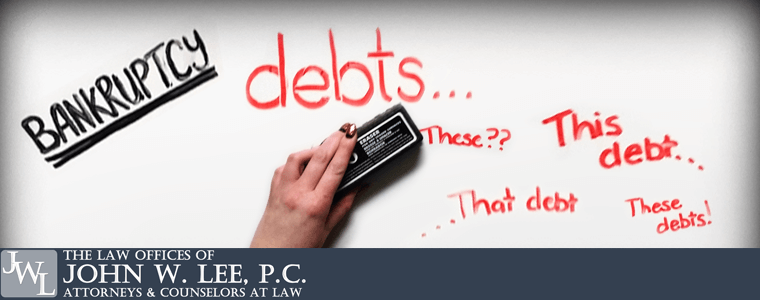By John Lee
A List of non-dischargeable debts:
Of course the number one question I hear from new bankruptcy clients is: “can bankruptcy wipe out my debts?” The answer is: It depends on what kind of debts you have. Here is a partial list of the most common types of debts that are NOT dischargeable in bankruptcy:
1. Debts you fail to list on your bankruptcy schedules may not be dischargeable in bankruptcy. Failure to list a creditor on your bankruptcy schedules could lead to that debt not being discharged in your bankruptcy. Bankruptcy law requires the debtor to list each and every creditor on his bankruptcy schedules.
2. Child support and spousal support payments are not dischargeable in bankruptcy. Also, debts found in a property settlement agreement or final decree of divorce that is similar to support may be non-dischargeable in bankruptcy as well.
3. Student Loans are not dischargeable in bankruptcy. Generally speaking, any debt incurred for an educational purpose is not dischargeable in bankruptcy. There are some very narrow exceptions for extreme hardship.
4. Most Tax Debt is not dischargeable in bankruptcy. Pay roll taxes, sales taxes and most personal income taxes are not dischargeable in bankruptcy. If your personal income taxes are over three years old, and you meet some other eligibility requirements, then you may be able to discharge them.
5. Fines, penalties and criminal restitution are not dischargeable in bankruptcy. Fines could include fines for traffic tickets, fines owed to the DMV or other governmental agencies. Fines are distinguished from debts owed for services the government offers such as trash collection, water and sewer which are dischargeable.
If you write a bad check, the act of writing a bad check is a crime and you can still be prosecuted for writing a bad check even if you filed for bankruptcy. Writing a “bad check” to a cash advance place where they ASK you to write a bad check is different than writing a bad check for goods you are leaving the store with. The difference being the cash advance location enticed you to write a bad check, knowing it was a bad check; the local grocery store expected the check to be good.
6. Debts incurred for personal injuries caused by driving under the influence of drugs or alcohol. If you are in an accident where you injured the other party and you were drinking and driving, then the debt to the injured party (for property damage, pain and suffering or medical) is non-dischargeable in bankruptcy.
7. Debts incurred by Fraud are non-dischargeable in Bankruptcy. This can happen in a variety of ways. If you misrepresented yourself (and your ability to pay) to the Lender while applying for the loan and the lender relied on the misrepresentation in making the loan, then the debt may be non-dischargeable. If you lied to the Lender about what you were going to do with the money when you received it, then the debt may be non-dischargeable in bankruptcy. Another example of fraud could be if you were receiving disability or other government assistance and improperly filled out the forms they used to determine eligibility.
8. A military enlistment bonus where the military person did not fulfill his reenlistment obligation. If you take a military enlistment bonus and then do not serve the entire time you the bonus required you to serve, then you may have to repay the military for the bonus. This debt is non-dischargeable for five years.
9. A State Court award of Attorney’s Fees in a Child Support matter may be non-dischargeable in bankruptcy. This may vary from State to State and will rely on the wording of the State Court order.
10. A Bankruptcy Court may determine that excessive use of credit cards immediately prior to filing bankruptcy for luxury goods could lead to those debts being not dischargeable in bankruptcy. Also, large Cash Advances taken immediately prior to filing bankruptcy could be non-dischargeable.
It is important to know if the debts you have are dischargeable in bankruptcy before you file. You do not want to go through the time and expense of a bankruptcy; only to find out your debts are non-dischargeable. The attorneys at John W. Lee, PC have helped thousands of people discharge millions in debt. We offer a free initial consultation to help you determine if a bankruptcy is the right solution for you.


